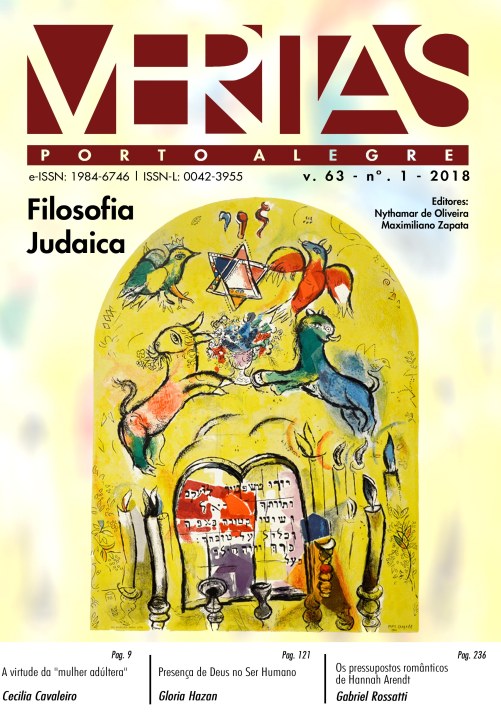Alethic Deflationism and Normativity: A Critique
DOI:
https://doi.org/10.15448/1984-6746.2018.1.29278Keywords:
Normativity, Alethic Deflationism, Paul Horwich, Michael Dummett, Filippo Ferrari, the world.Abstract
The paper starts by highlighting that virtually nobody would object to claims such as “to regard an assertion or a belief or a thought as true or false is to regard it as being right or wrong”—a claim that shows that truth is intrinsically normative. It is well known that alethic deflationists deny this. Paul Horwich, for instance, maintains that nothing shows that TRUTH is a normative concept in the way that OUGHT is. By relying on a distinction among dimensions of normativity I will try to pinpoint the weakness of Horwich’s argument in the fact that he works with a strong, uncalled-for, interpretation of normativity, whereas a weaker interpretation is more than enough. However, the impression might persist that a different understanding of the normativity of truth on the part of deflationists could eventually show the compatibility between alethic deflationism and normativity. The remaining part of the paper is devoted to contend that this is a wrong impression. Accordingly, it is stated that the normativity exerted by truth is ascribable in the final analysis to the world, and the provocative claim is defended that alethic deflationism lacks the conceptual resources to account for the relation between language and the world.
Downloads
References
Armour-Garb, B.P. and Beall, JC 2005 (eds.), Deflationary Truth, Open Court, Chicago.
Auxier, R.E. and Hahn, L.E. 2007 (eds.), The Philosophy of Michael Dummett, Open Court, Chicago.
Bilgrami, A. 2007, Pursuing an Analogy, in Auxier and Hahn 2007, 383-408.
Cozzo, C. 2014, Is Truth a Chimera?, in From a Heuristic Point of View: Essays in Honour of Carlo Cellucci, E. Ippoliti and C. Cozzo (eds.), Cambridge Scholars Publishing, Newcastle upon Tyne, 107-24.
Dummett, M. 1959, Truth, in Truth and Other Enigmas, Harvard University Press, Cambridge (MA), 1-24.
Dummett, M. 2007, Reply to Wolfgang Künne, in Auxier and Hahn 2007, 345-50.
Ferrari, F. 2016a, Disagreement about Taste and Alethic Suberogation, in “Philosophical Quarterly”, 66, 264, 516-35. DOI: https://doi.org/10.1093/pq/pqv116
Ferrari, F. 2016b, The Value of Minimalist Truth, in “Synthese”, DOI 0.1007/s11229-016-1207-9.
Ferrari, F. 2016c, Relativism, Faultlessness and Parity: Why We Should be Pluralists about Truth’s Normative Function, in “Argumenta”, 2, 1, 77-94.
Horwich, P. 1998, Truth, 2nd Edition, Clarendon Press, Oxford. DOI: https://doi.org/10.1093/0198752237.001.0001
Horwich, P. 2006, The Value of Truth, in “Noûs”, 40, 347-60. DOI: https://doi.org/10.1111/j.0029-4624.2006.00613.x
Horwich, P. 2016a, Wittgenstein on Truth, in “Argumenta”, 2, 1, 95-106.
Horwich, P. 2016b, Is TRUTH a Normative Concept?, in “Synthese”, DOI 10.1007/s11229-016-1208-8. DOI: https://doi.org/10.1007/s11229-016-1208-8
Künne, W. 2007, Two Principles Concerning Truth, in Auxier and Hahn 2007, 315-44.
Leeds, S. 1978, Theories of Reference and Truth, in Armour-Garb and Beall 2005, 33-49.
Lynch, M.P. 2001 (ed.), The Nature of Truth. Classic and Contemporary Perspectives, MIT Press, Cambridge (MA). DOI: https://doi.org/10.7551/mitpress/4884.001.0001
Lynch, M.P. 2009, Truth as One and Many, Clarendon Press, Oxford. DOI: https://doi.org/10.1093/acprof:oso/9780199218738.001.0001
Putnam, H. 1999, The Threefold Cord. Mind, Body, and World, Columbia University Press, New York.
Rorty, R. and Engel, P. 2007, What’s the Use of Truth?, P. Savidan (ed.), New York, Columbia University Press.
Downloads
Published
How to Cite
Issue
Section
License
Copyright
The submission of originals to Revista Veritas implies the transfer by the authors of the right for publication. Authors retain copyright and grant the journal right of first publication. If the authors wish to include the same data into another publication, they must cite Revista Veritas as the site of original publication.
Creative Commons License
Except where otherwise specified, material published in this journal is licensed under a Creative Commons Attribution 4.0 International license, which allows unrestricted use, distribution and reproduction in any medium, provided the original publication is correctly cited. Copyright: © 2006-2020 EDIPUCRS</p






